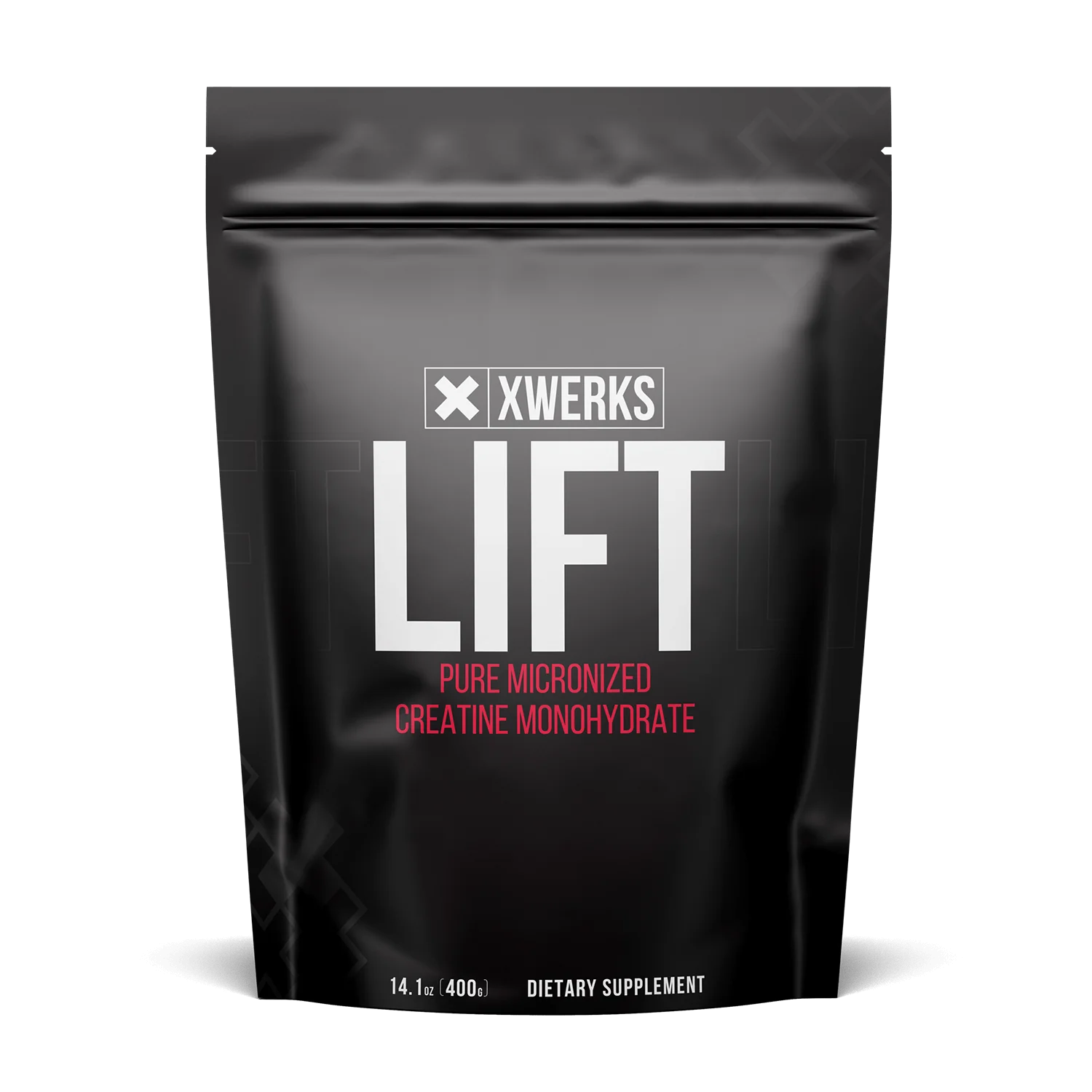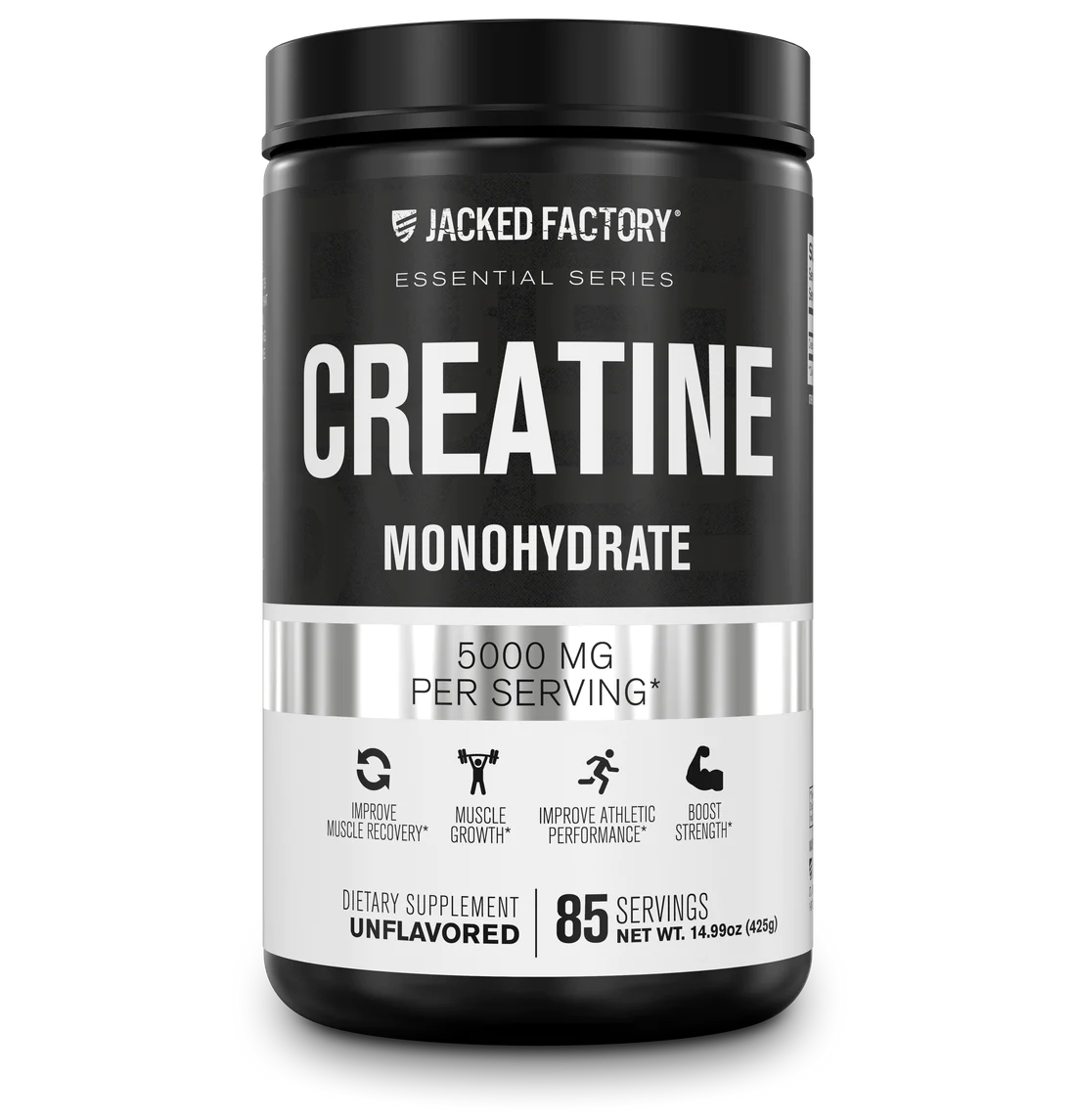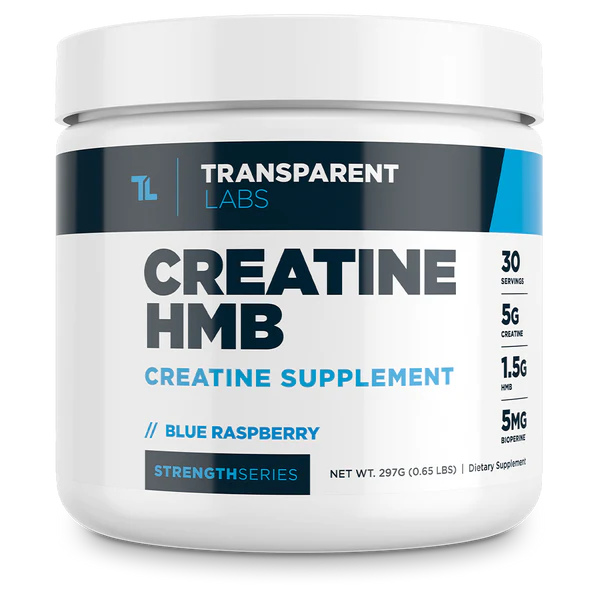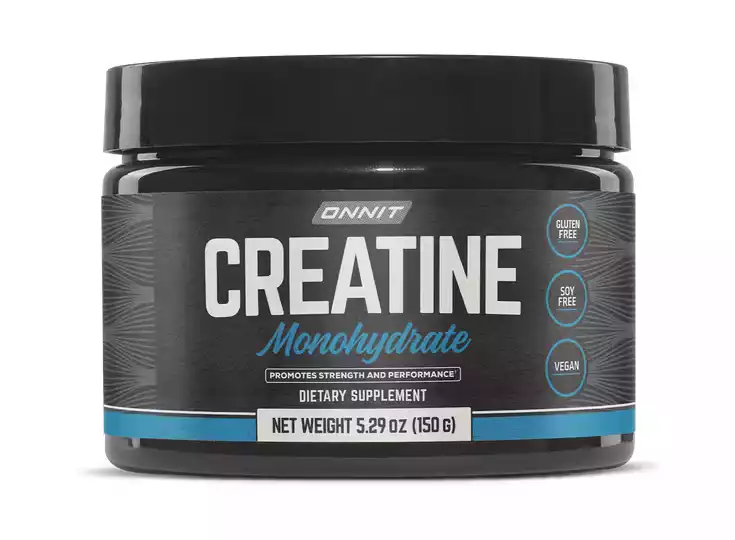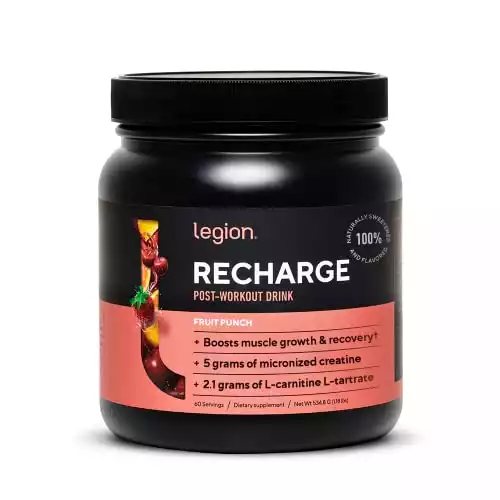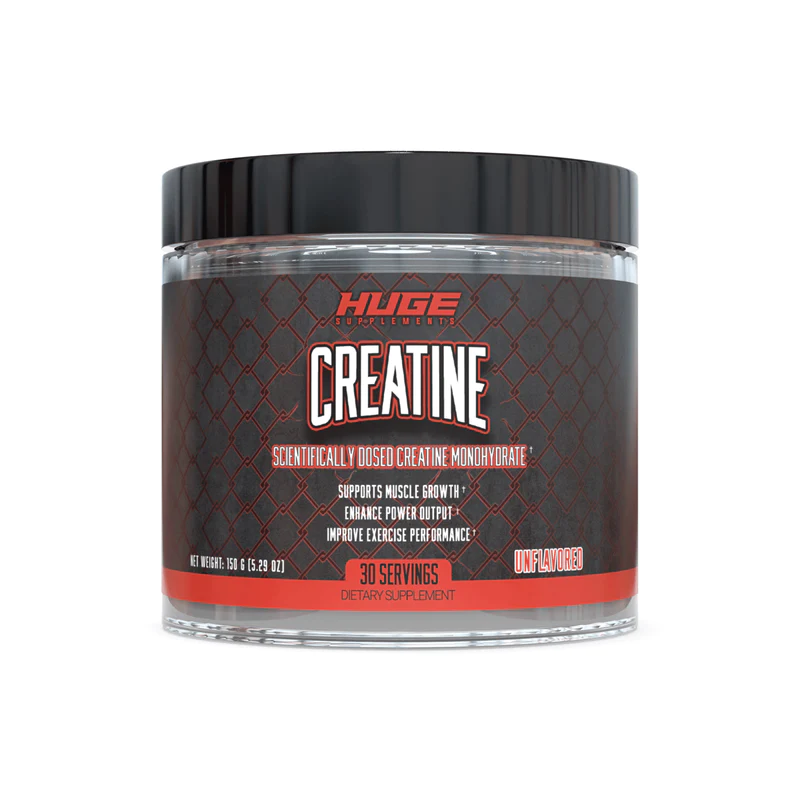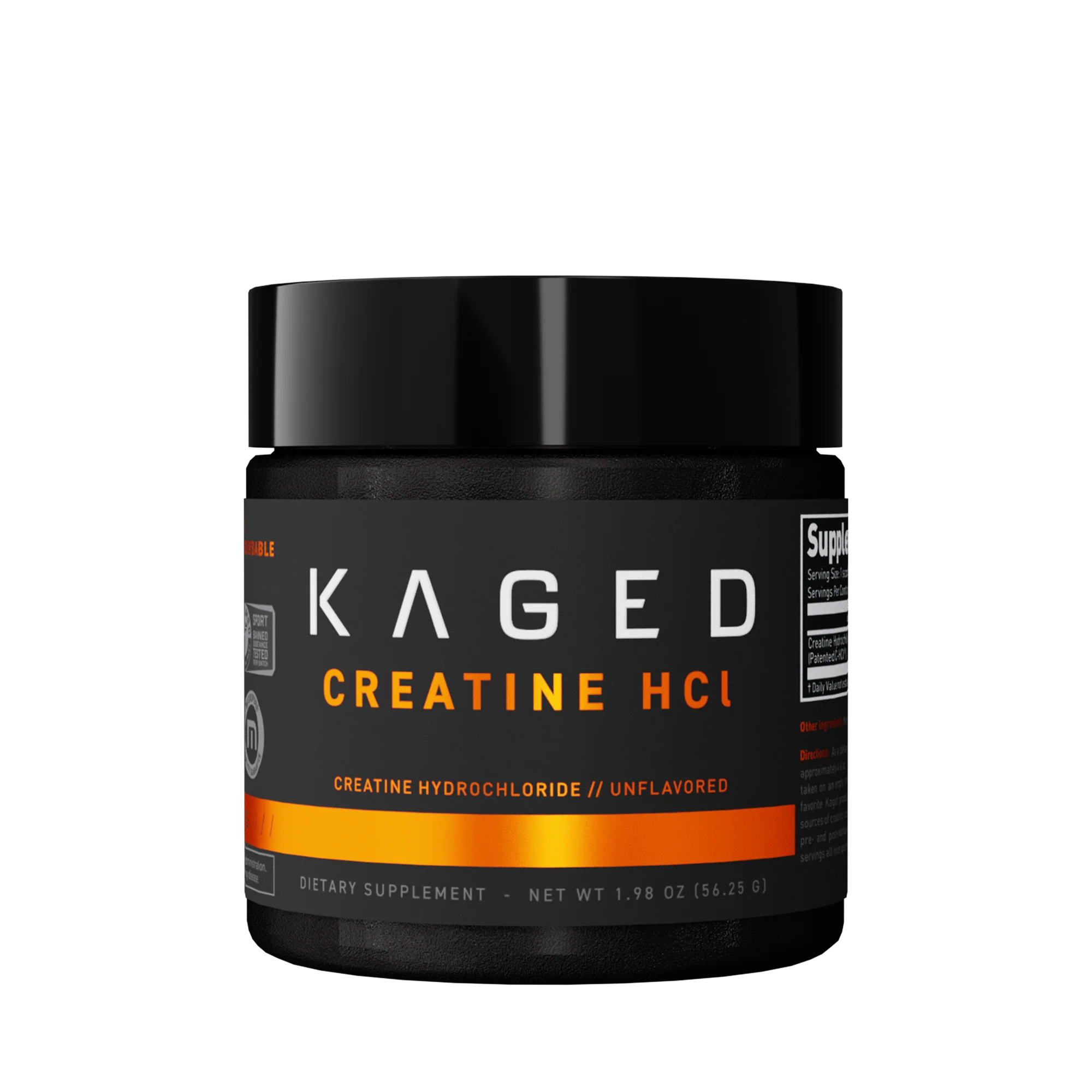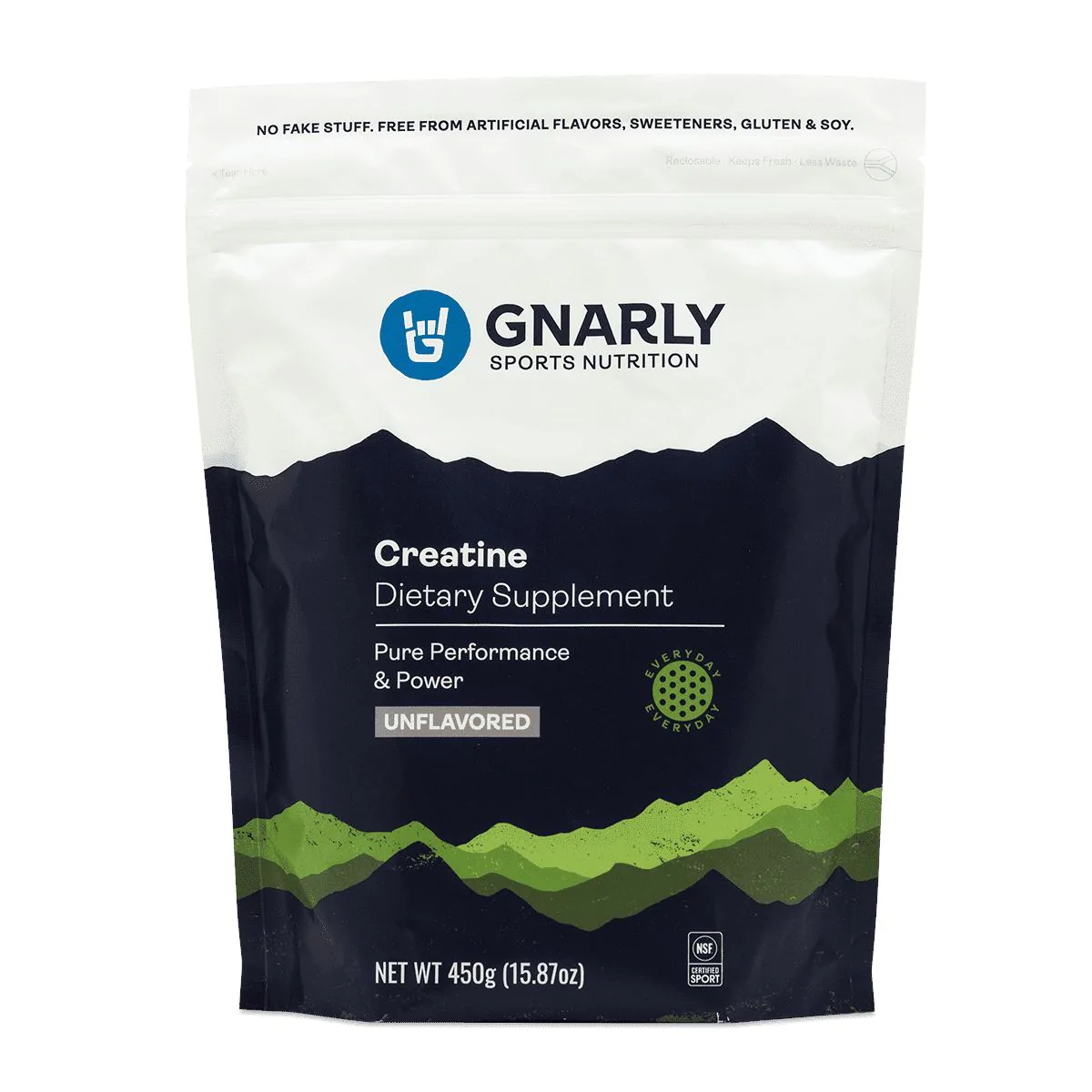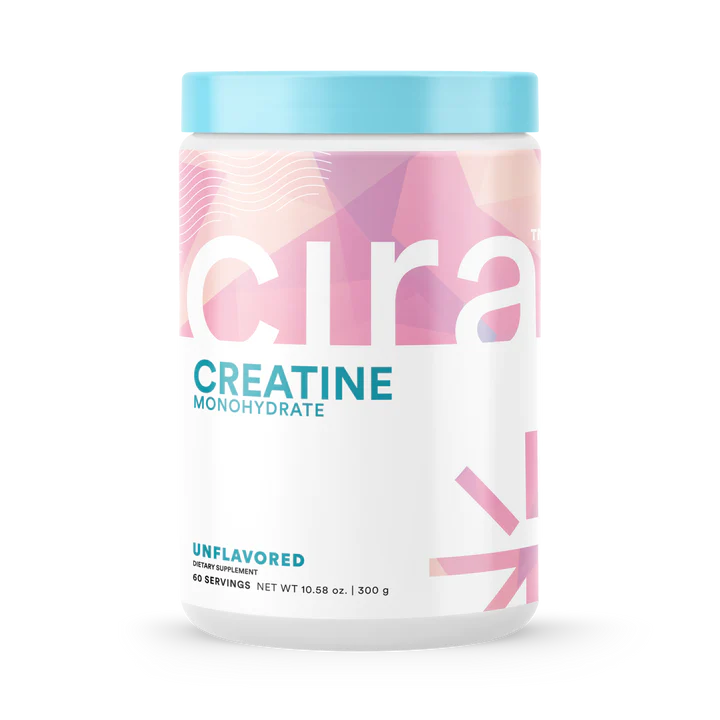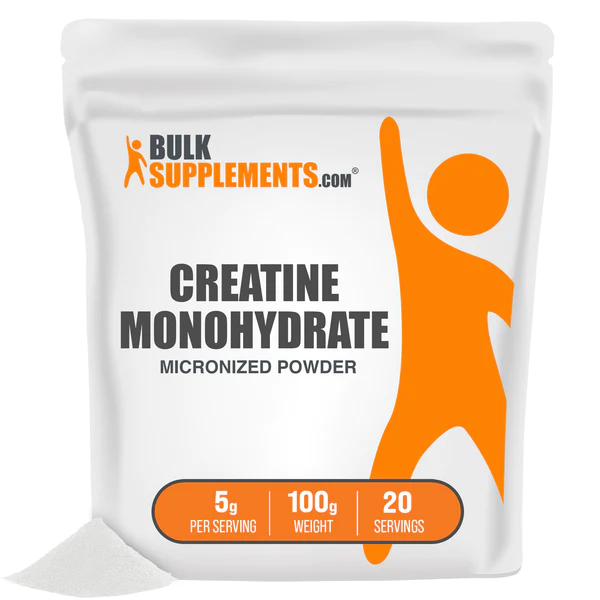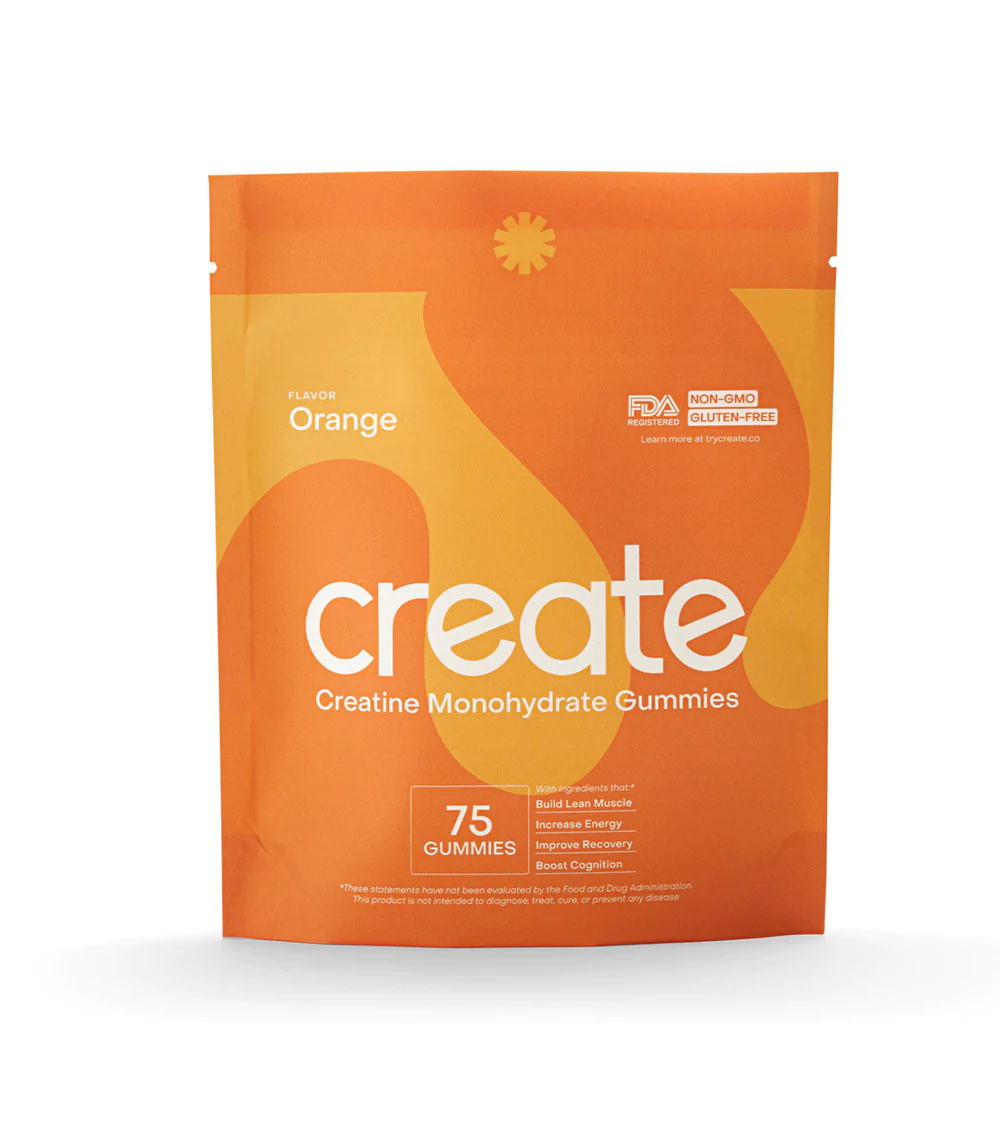
If you’ve spent any time in the gym or browsing your favorite athletes’ social media channels, chances are you’ve heard of creatine. Creatine is an amino acid produced naturally by the body and found in animal-based foods, but many athletes and gym-goers take creatine supplements to help maximize its benefits. Numerous studies have shown positive effects of creatine on athletic performance, body composition, muscle recovery, and brain health.
When shopping for a creatine supplement for the first time, you may not know where to begin. The process can sometimes feel overwhelming even for those who are familiar with creatine. To help guide you in the right direction, we’ve researched and tested several creatine supplements and compiled a list of options that can be suitable for various needs. After we review our top picks, we’ll discuss the different types of creatine, the benefits of creatine, dosage recommendations, and the optimal time to take it. We’ll also provide a guide on what to consider when buying a creatine supplement.
Our Top Picks for the Best Creatine Supplements
Best Creatine for Muscle Growth: XWERKS Lift
XWERKS Lift
XWERKS Lift is micronized to form a fine powder, which can be easier to digest for those who have sensitive stomachs. There are no artificial ingredients, and it mixes well with liquids and other supplements.
We earn a commission if you make a purchase, at no additional cost to you.
Specifications
- Number of servings: 80
- Cost: $49.00 ($0.61 per serving)
- Amount of creatine per serving: Five grams
- Flavors: Unflavored
Pros
- Micronized powder that can be easier to digest
- Dissolves well in various liquids
- Won’t alter the taste of the beverages or other powders you mix it with
Cons
- The seal on the bag can be difficult to close
XWERKS Lift is our choice for the best creatine overall because it mixes well with everything, doesn’t contain artificial ingredients, and is made with creatine monohydrate, the most thoroughly-researched form of creatine. Plus, at $0.61 per serving, this is a creatine supplement that won’t break the bank.
Another benefit of this creatine supplement is that it’s micronized. Micronized creatine monohydrate undergoes more filtration, and, therefore, contains smaller molecules than regular creatine monohydrate. For this reason, it can be easier to digest and result in fewer side effects. This can help prevent digestive issues, such as cramping or bloating, which some people experience with regular creatine monohydrate.
Micronized creatine like XWERKS Lift can also dissolve more easily without leaving behind any clumps. Because it’s unflavored, it won’t alter the taste of any other beverages or supplement powders you mix it with.
One of the only things we don’t like about this creatine is that the bag can be difficult to reseal. You’ll have to be careful when storing it to ensure the powder doesn’t spill or other food items don’t get into the bag.
Best Creatine for Teens: Jacked Factory Creatine Monohydrate
Jacked Factory Creatine Monohydrate
This is a simple creatine monohydrate powder at a reasonable price that dissolves easily, doesn’t contain dyes or fillers, and offers five grams of creatine per serving.
We earn a commission if you make a purchase, at no additional cost to you.
Specifications
- Number of servings: 85
- Cost: $34.99 ($0.41 per serving)
- Amount of creatine per serving: Five grams
- Flavors: Unflavored
Pros
- More affordable than other creatine powders on the market
- Made in the USA in a cGMP-certified facility
- No dyes or fillers
- Dissolves quickly and doesn’t have a gritty texture
Cons
- The container has a small opening that can make it hard to reach the bottom
There’s a misconception that creatine is dangerous for teens because many people consider it a performance-enhancing drug, which can stunt an adolescent’s growth and lead to significant health concerns such as heart attacks. (1) But while it can enhance athletic performance, it’s not classified as a drug, and recent research has shown that creatine is safe for teens who strength train. (2)
Jacked Factory Creatine Monohydrate is a solid choice for teens because it doesn’t contain any ingredients other than creatine monohydrate and is reasonably priced, which is a nice feature for teenagers who don’t have a lot of extra cash lying around. One tub costs around $34.99 and has 85 servings, which equals about $0.41 per serving. This is much lower than other creatine monohydrate powders, which can cost $1 to $2 per serving.
Despite the lower cost, you still get a high-quality product. Jacked Factory Creatine Monohydrate doesn’t contain any fillers or dyes, and it’s made in a cGMP-certified facility in the USA. This means the equipment and manufacturing processes are compliant with the FDA, so you can feel confident knowing you’re consuming a safe product.
This creatine powder dissolves well when blended with plain water or mixed with other supplements, such as protein powder or pre-workout. The opening of the tub is small, so you may find it difficult to reach the bottom if you have large hands. If needed, you can always use a regular spoon to scoop out the powder, though you may also want to use a food scale if you want to know exactly how much you’re taking.
Best Creatine for Muscle Growth: Transparent Labs Creatine HMB
Transparent Labs Creatine HMB
This creatine contains hydroxy methylbutyrate (HMB), which can help you grow and preserve muscle mass. It’s available in 10 flavors and comes in an unflavored version. Plus, it’s free from additives, fillers, artificial sweeteners, and colored dyes.
We earn a commission if you make a purchase, at no additional cost to you.
Specifications
- Number of servings: 30
- Cost: $49.99 ($1.67 per serving)
- Amount of creatine per serving: Five grams
- Flavors: Black Cherry, Blue Raspberry, Fruit Punch, Hawaiin Splash, Orange, Peach Mango, Sour Grape, Strawberry Lemonade, Tropical Punch, Unflavored, Watermelon
Pros
- Comes in 10 flavors plus an unflavored version
- No artificial sweeteners, dyes, additives, or fillers
- May digest more easily, thanks to the addition of BioPerine® (black pepper extract)
- Also contains vitamin D and hydroxy methylbutyrate (HMB), which may help increase strength and lean muscle mass and decrease fat mass
Cons
- May be too expensive for some
Creatine on its own has been shown to increase muscle mass because it can increase the body’s concentration of IGF-1, a hormone responsible for the growth of new muscle tissue. (3) For those looking for a creatine supplement with additional muscle-building benefits, Transparent Labs Creatine HMB may be the right choice. Each serving provides 1,500 milligrams of hydroxy methylbutyrate (HMB), which may aid muscle growth and retention, and 12.5 micrograms of vitamin D, which can help prevent fatigue and allow you to train harder for longer. (4)(5) There are also five milligrams of black pepper extract, which can help your body utilize the other ingredients more effectively. (6)
Transparent Labs Creatine HMB tastes great, dissolves well without leaving any clumps behind, and doesn’t contain any artificial sweeteners, fillers, colored dyes, or additives. We also love that it’s available in 10 flavors. Whether you enjoy fruity or tropical flavors, you can find one that suits your preferences. There’s also an unflavored version, which is great for mixing into protein shakes, coffee, or other beverages.
Because of the extra ingredients in Transparent Labs Creatine HMB, it is pricier than other options. However, the higher price may be worth it if you want an extra boost in performance in the gym or are struggling to build muscle.
Best Creatine for Beginners: Onnit Creatine Monohydrate
Onnit Creatine Monohydrate
This third-party-tested creatine supplement comes with 30 servings at an affordable price, making it a great option for beginners to try before fully committing to a creatine regimen.
We earn a commission if you make a purchase, at no additional cost to you.
Specifications
- Number of servings: 30
- Cost: $14.99 ($0.50 per serving)
- Amount of creatine per serving: Five grams
- Flavors: Unflavored
Pros
- Third-party tested to ensure it’s free of banned substances
- Budget-friendly
- Can easily mix well with liquids and other supplements
Cons
- Small number of servings per container
- Can be messy
One container of Onnit’s creatine monohydrate only has 30 servings, which is much lower than the 60 to 85 servings you can find from other brands. But we think this is a solid choice if you’re taking creatine for the first time and don’t know how you’ll react to it. By starting with a small container, you won’t be stuck with a huge tub if you don’t like the product.
Plus, this can be a safe creatine powder to start with because it’s third-party tested. This means an independent lab has verified that the product doesn’t contain any banned substances. More supplement brands are implementing third-party testing to help bolster their reputation and prove the quality of their products, but there are still many brands that don’t bother with it. Looking for third-party verified products is a good place to start when you’re new to taking supplements because you can be more confident that they aren’t contaminated with harmful ingredients.
If you do become a fan of this creatine, you can set up subscriptions for auto deliveries, so you don’t have to remember to reorder it whenever you run out.
Like XWERKS Lift, Onnit’s creatine monohydrate is micronized, so it may dissolve easier in liquids and cause fewer gastrointestinal issues. It’s also unflavored and can blend with flavored beverages or powders seamlessly. However, because the powder is so fine, it can get messy. You’ll need to be careful when scooping it into your glass or shaker bottle to avoid spilling it and getting the powder everywhere.
Best Tasting Creatine: Legion Recharge
Legion Recharge
With l-carnitine and corosolic acid, this creatine supplement can help ease muscle pain and inflammation after a tough workout. There are six flavor options and an unflavored option, but we recommend the Strawberry Lemonade flavor.
We earn a commission if you make a purchase, at no additional cost to you.
05/25/2023 03:11 pm GMT
Specifications
- Number of servings: 60
- Cost: $59.99 ($1.00 per serving)
- Amount of creatine per serving: Five grams
- Flavors: Blue Raspberry, Fruit Punch, Grape, Strawberry Kiwi, Strawberry Lemonade, Unflavored, Watermelon
Pros
- No refined sugars, artificial sweeteners, or food dyes
- Tested by Labdoor to ensure it doesn’t contain banned substances
- Contains additional ingredients that can help prevent muscle soreness and enhance recovery
Cons
- May not be ideal for those who want a simpler creatine supplement
Legion Recharge isn’t available in as many flavors as Transparent Labs HMB, but we prefer the taste of it and especially like the Strawberry Lemonade flavor. It’s sweet, but there’s a hint of tartness, so it’s not cloying. If you prefer to mix your creatine with flavored protein or branched-chain amino acid (BCAA) powders, you can opt for the unflavored version. Whichever you choose, you won’t find any artificial flavors, food colorings, or sweeteners.
Besides tasting great, we also like the recovery-enhancing benefits of this creatine supplement. Creatine on its own has been shown to aid muscle recovery after workouts, but Recharge contains additional ingredients that can help ensure you’re ready to tackle your next training session. (7)
For example, each serving of Recharge has 2.5 grams of l-carnitine, which may prevent muscle pain and tenderness after exercise. (8) It also contains 10.5 milligrams of corosolic acid, which can reduce inflammation. (9)
At $1.00 per serving, this isn’t the cheapest creatine powder. You can find brands whose creatine costs around $0.30 per serving. But Legion Recharge contains all-natural ingredients and is third-party tested by Labdoor to ensure it doesn’t contain banned substances or impurities. For these reasons, we think the price is fair.
Best Creatine for Men: Huge Supplements Creatine Monohydrate Powder
Huge Supplements Creatine Monohydrate Powder
This creatine powder has great dissolvability, and because it’s available in an unflavored version, it’s easy to add to your current supplement stack.
We earn a commission if you make a purchase, at no additional cost to you.
Specifications
- Number of servings: 30
- Cost: $29.95 ($1.00 per serving)
- Amount of creatine per serving: Five grams
- Flavors: Mango Lemonade, Orange, Unflavored
Pros
- Manufactured in the USA in a GMP-certified facility
- Contains no fillers or unnecessary ingredients
- Dissolves easily
Cons
- Flavored versions may be too sweet for some
- Not a lot of servings per container
For men who need a straightforward creatine supplement, we think this option from Huge Supplements is a good choice. The unflavored version has no ingredients other than creatine monohydrate, so you can easily add it to your existing supplement stack.
The Mango Lemonade and Orange flavors are on point, though they may be too sweet for those who prefer less saccharine tastes. They also contain artificial flavors and sucralose, so if you are sensitive to those ingredients or prefer to avoid them, you may want to stick with the unflavored version.
At right around $1.00 per serving, this creatine powder is towards the higher end of the products on this list. This can put it out of reach for those with tight budgets. Plus, one container only provides 30 five-gram servings, so the cost can add up if you have to replenish it frequently. Still, this could be a good option if you want a simple creatine supplement without a long ingredient list, and the higher price can be justified by the fact that it is made in the USA in a facility that meets Good Manufacturing Process (GMP) standards for creating safe and effective products.
Best Creatine for Cutting: Kaged Creatine HCl
Kaged Creatine HCl
For those who can’t stomach creatine monohydrate, this may be a better option, as creatine HCl may cause fewer side effects. It’s available in an unflavored or Lemon Lime-flavored powder or in vegetable capsules.
We earn a commission if you make a purchase, at no additional cost to you.
Specifications
- Number of servings: 75
- Cost: $24.99 ($0.33 per serving)
- Amount of creatine per serving: 0.75 grams
- Flavors: Lemon Lime, Unflavored, Vegetable Caps
Pros
- Available in powder or capsule form
- More cost-effective than other options
- Creatine hydrochloride may dissolve and digest easier than creatine monohydrate
- Informed Sport certified to be free of banned substances
- No grainy texture
Cons
- Not a lot of flavor options
- The Lemon Lime flavor contains sucralose
Kaged Creatine HCl is a form of creatine called hydrochloride (HCl). Creatine HCl can be more suitable for those with sensitive stomachs, as anecdotal reports suggest it dissolves more easily and causes less bloating than creatine monohydrate. For these reasons, we think this is a good choice for bodybuilders or those with weight loss goals, as you may feel less puffy and experience fewer fluctuations on the scale, which are possible side effects of creatine monohydrate.
However, it should be noted that any weight gain you may notice from creatine when you first start taking it is likely just temporary water weight and not indicative of rapid increases in muscle mass. That water weight should go away within a few weeks, and any muscle mass you hope to gain would take at least a couple of months to achieve.
This creatine powder only provides 0.75 grams of creatine per serving, unlike creatine monohydrate supplements, which typically provide up to five grams per serving. The recommended dosage is three to five grams of creatine per day, but for creatine hydrochloride, 0.75 grams may be all you need, as small amounts of creatine HCl may provide the same benefits as larger doses of creatine monohydrate. (10)
We found the Lemon Lime flavor to be quite tasty, with a great balance of sweetness and tartness. It didn’t have a gritty texture, unlike other creatine powders we’ve tried. However, it does contain sucralose. If you prefer to avoid artificial sweeteners, go for the unflavored version instead. You can also opt for the vegan-friendly vegetable caps, which cost the same as the powder and also provide 0.75 grams of creatine HCl per serving.
Best Vegan Creatine: Gnarly Creatine
Gnarly Creatine
Gnarly Creatine Monohydrate is tested for banned substances and other potentially harmful ingredients, such as lead and pesticides. It’s also free from gluten, soy, and artificial flavors and sweeteners.
We earn a commission if you make a purchase, at no additional cost to you.
Specifications
- Number of servings: 90
- Cost: $55.00 ($0.61 per serving)
- Amount of creatine per serving: Five grams
- Flavors: Unflavored
Pros
- No artificial flavors or sweeteners
- Gluten- and soy-free
- NSF Content Certified and NSF Certified for Sport
- One bag can last several months, depending on how much creatine you take each day
Cons
We recommend Gnarly’s creatine monohydrate for vegans because it’s made from Creapure®, a brand of creatine monohydrate that’s not derived from animal products. Other brands also use Creapure® as their base, but they may also test their creatine supplements on animals or make pills with capsules sourced from animal by-products, making them non-vegan-friendly. Gnarly doesn’t participate in animal testing, and it’s a powder, so vegans don’t have to worry about animal cruelty or taking capsules with animal-sourced gelatin. Because it’s Halal and Kosher certified, too, it’s suitable for a wide range of dietary requirements.
We also like that Gnarly tests its creatine for heavy metals, microbes (which include things like bacteria), and pesticides in addition to testing it for banned substances. Plus, the creatine doesn’t contain artificial sweeteners or flavors, gluten, or soy, which can also make it a great choice for those looking for pure creatine powder.
At around $55, this creatine is one of the most expensive on our list. But you get a whopping 90 servings per bag, which equals about $0.61 per serving. The per-serving price is reasonable, in our opinion, considering the supplement goes through a thorough third-party testing process and doesn’t contain junk ingredients.
Because it’s unflavored, you can easily add this powder to your supplement stack without altering the taste of your other products. However, it can take a while to dissolve if you stir it with a spoon. A blender or shaker bottle may be your best bet when consuming it.
Best Creatine for Women: Cira Creatine Monohydrate
Cira Creatine Monohydrate
For women who want to increase lean muscle mass and improve their performance in the gym, Cira’s creatine monohydrate powder can be a great choice. It’s unflavored and doesn’t contain any other ingredients, so it mixes well with any type of liquid.
We earn a commission if you make a purchase, at no additional cost to you.
Specifications
- Number of servings: 60
- Cost: $34.99 ($0.58 per serving)
- Amount of creatine per serving: Five grams
- Flavors: Unflavored
Pros
- Decent number of servings per container
- Bright packaging that may appeal to women
- No grainy texture
Cons
- No flavored options
- Doesn’t dissolve easily
There aren’t really any women-specific creatine supplements, as the ones that work well for men can also be good for women. But Cira sells other products that can benefit women, such as its No Filter – Complexion supplement that can help promote healthier skin, hair, and nails — common concerns for many women. If you’re a female athlete, bundling your Cira creatine with some of the brand’s other products can help you improve your performance in the gym (since creatine can help improve energy levels and strength output) and boost your self-confidence.
Cira’s creatine powder provides five grams of creatine per serving, and one tub has 60 servings, which is similar to several other creatine offerings on the market. There’s only an unflavored version, so you may want to consider another brand if you prefer having flavor options. It also doesn’t dissolve as easily as other powders we’ve tried. You may have to stir it well or shake it in a blender bottle for a couple of minutes to ensure there are no clumps.
Best Creatine Pills: Bulk Supplements Creatine Monohydrate Capsules
Bulk Supplement Creatine Monohydrate Pills
Starts at $0.49 per serving
Bulk Supplements’ creatine pills offer a convenient way to take your creatine on the go, and you can be precise with your dosing since everything is pre-measured for you.
We earn a commission if you make a purchase, at no additional cost to you.
Specifications
- Number of servings: 14 to 43
- Cost: $11.96 to $20.96 ($0.49 to $0.85 per serving)
- Amount of creatine per serving: Five grams
- Flavors: N/A
Pros
- Convenient way to take your creatine supplement on the go
- No need to measure anything because you get five grams of creatine with every seven-capsule serving
- Third-party tested for label accuracy, potency, and safety
- Manufactured in a cGMP-certified facility
Cons
- Not vegan-friendly because the capsules are made with bovine gelatin
- More expensive than creatine powder
- Have to take seven capsules to get the recommended dose of five grams of creatine
For those who want a convenient way to take creatine while on the go, Bulk Supplements Creatine Monohydrate Capsules are a solid choice. You can easily throw the container in your gym bag, and it won’t make a powdery mess.
Pills are also good for anyone who wants to take precise doses of creatine. You don’t have to worry about measuring anything because you know you’ll get five grams of creatine — the recommended daily dose for optimal benefits — with each serving. One serving of the Bulk Supplements creatine capsules is seven pills, though, which is something to note if you have trouble swallowing pills.
One drawback of taking creatine pills is that they are more expensive than powders. For example, Bulk Supplement creatine pills can cost anywhere from around $0.49 to $0.85 per serving. In comparison, you can find creatine monohydrate powder for as little as $0.30 per serving. The extra cost of the pills is due to the additional manufacturing required to get the powder into the capsules, but it may be worth it for the convenience of not having to measure a powdered supplement yourself.
Also, the capsules contain bovine gelatin, so they’re not suitable for those who don’t consume animal products. Vegans who want to take creatine pills should look for ones made with vegan-friendly ingredients, such as vegetable cellulose, instead.
Best Creatine Gummies: Create Wellness Creatine Monohydrate Gummies
Create Wellness Creatine Monohydrate Gummies
Starts at $1.67 per serving
Anyone who enjoys citrus tastes will like the orange flavor of the Create Wellness creatine gummies. Because they’re safe for vegans, non-GMO, and gluten-free, they’re suitable for a wide range of dietary needs.
We earn a commission if you make a purchase, at no additional cost to you.
Specifications
- Number of servings: 15 to 90
- Cost: $45.00 to $180.00 ($1.67 to $3.00 per serving)
- Amount of creatine per serving: Five grams
- Flavors: Orange
Pros
- Vegan-friendly
- Gluten- and GMO-free
- Orange flavor is tasty
Cons
- Each serving has five grams of sugar and 12 grams of carbohydrates
- More expensive than pills or powder
Like pills, creatine gummies offer a convenient, mess-free way to take your creatine on the go. They’re also a better option for those who have trouble swallowing pills. We especially love the Create Wellness creatine gummies because they taste great and are non-GMO, vegan-friendly, and gluten-free, making them suitable for various dietary needs.
One serving is five gummies and provides five grams of creatine, though there are also five grams of sugar and 12 grams of carbohydrates in each serving. The sugar content isn’t super high, but it’s worth noting because other creatine gummies on the market have at least half that amount per serving.
Additionally, 12 grams of carbs can quickly add up for anyone following a low-carb diet. With prices starting around $1.67 per serving, the gummies also cost much more than other creatine supplements, which you can find for more than half the cost. But if you have an aversion to pills and want a travel-friendly creatine supplement, you may be able to justify the sugar and carbohydrate content and the price.
How We Chose the Best Creatine Supplements
We consider several factors when compiling our best lists to ensure there are suitable options for various consumers. For creatine, we analyzed the cost, the type of creatine, the formulation, and whether the supplement is third-party tested.
Price
Creatine prices vary based on the brand, the overall ingredients, and whether or not it’s third-party tested. Later in the article, where I discuss the factors to consider when buying creatine, I provide a more detailed analysis of the cost of creatine. But while supplements can be expensive, buying a creatine powder shouldn’t leave you strapped for cash. Because everyone has different budgets, we included creatine supplements with varying price points on our list.
Formulation
Most creatine supplements are straightforward and contain one ingredient — creatine. Others contain additional ingredients that can help support muscle growth, aid post-workout recovery, or add flavor to the powder. On our list, we included options that are pure creatine and some that include extra ingredients to help you hone in on your goals and find a product that suits your taste preferences.
Additional ingredients you may find in your creatine supplement for more muscle-building or recovery benefits include:
- L-carnitine: An amino acid that can help prevent pain and tenderness in the muscles after a workout. (5)
- Corosolic acid: A substance found in the banaba plant that can help reduce inflammation. (6)
- Hydroxy methylbutyrate (HMB): A metabolite of leucine, an amino acid that helps stimulate muscle protein synthesis (the process of building new muscle). (4)
Creatine Type
As we’ll discuss below, there are several types of creatine, but they’re not all effective. The creatine supplements on our list are primarily creatine monohydrate, which is the most popular form used in scientific studies. To make sure you have a larger selection to choose from, we also included some creatine hydrochloride (HCl) supplements. Creatine HCl isn’t quite as heavily researched as monohydrate, but it has shown promise and can be just as effective.
Third-Party Testing
Many of the creatine supplements on our list have been tested by an independent third party, such as Labdoor, to ensure their products are free from impurities or other potentially harmful ingredients, such as lead. Some have also been tested by Informed Sport to ensure they don’t contain substances on the World Anti-Doping Agency’s banned list.
What Is Creatine?
Creatine is an amino acid produced in the liver, kidneys, and pancreas. Those organs deliver about 95% of the creatine they produce to the muscles, which then use it as an energy source during intense bouts of physical activity, such as lifting heavy weights. Small amounts of creatine also go to the heart, brain, and other tissues.
Creatine is also found in foods like red meat, seafood, and cow’s milk, but you’d have to eat a lot of animal products to get the recommended dose of three to five grams per day. One pound of ground beef, for example, only has about one gram of creatine. Furthermore, the human body only produces about one to two grams of creatine per day. For these reasons, athletes or those who don’t eat animal products may choose to take a creatine supplement to optimize their creatine intake.
When the muscles’ creatine stores are elevated, they are better able to perform at a high intensity. As I’ll discuss below, this means you can work out for longer and perform more volume, which can indirectly help you build more muscle. Creatine also helps increase the body’s concentration of IGF-1, a hormone responsible for the growth of new muscle tissue. (3)
What Are the Different Types of Creatine?
There are many types of creatine, but some are more effective than others. The most promising ones that show potential for supporting muscle growth and athletic performance include creatine monohydrate, creatine hydrochloride, buffered creatine, creatine magnesium chelate, and creatine nitrate.
Creatine Monohydrate
Creatine monohydrate is the most popular and widely-researched form of creatine. It’s made by bonding creatine to a water molecule and is generally the cheapest form of creatine you can find.
Some creatine monohydrate supplements are micronized, meaning they undergo a more thorough filtration process to cut the molecules into smaller granules. This results in a powder that can dissolve more easily in liquids and be easier to digest.
I’ve used both regular creatine monohydrate and micronized creatine monohydrate, and in my experience, the micronized version does blend better. I can’t speak to whether or not micronized creatine is better for my digestion, as I’ve fortunately never experienced nausea or other stomach issues after taking any form of creatine. But I’ve seen many reports from people who tolerate micronized creatine better than regular creatine, so a micronized powder is worth considering if you have a sensitive stomach.
Creatine Hydrochloride
Creatine hydrochloride, or creatine HCl, isn’t as widely studied as creatine monohydrate. However, some anecdotal evidence suggests the body may be able to digest it easier and absorb it more efficiently. It’s made by combining creatine with a hydrochloride molecule, resulting in a more water-soluble product. For this reason, it’s possible that you can take smaller doses of creatine HCl than monohydrate (less than one gram vs. three to five grams, respectively) and experience the same benefits.
Buffered Creatine
Like creatine HCl, buffered creatine may be gentler on the stomach for those who can’t tolerate creatine monohydrate well. It’s combined with other substances, such as sodium bicarbonate, to help increase its pH. Therefore, it may not break down as much during digestion, and the muscles may absorb it more efficiently. More research is needed to determine the efficacy of buffered creatine, but some studies suggest that it’s not any more effective than creatine monohydrate. (11)
Creatine Magnesium Chelate
Creatine magnesium chelate is creatine that’s bound to magnesium and may result in less water retention than creatine monohydrate. (12) You’ll typically see creatine magnesium chelate branded as MagnaPower®, and you can find it on its own or as part of another supplement, like pre-workout.
Creatine Nitrate
Creatine nitrate is formed by combining creatine and nitrate molecules together. Some studies suggest that individuals who take creatine nitrate may perform better in the gym than those who don’t supplement with creatine at all. However, creatine nitrate may not be as effective as creatine monohydrate. (13)
Other Types of Creatine
Other forms of creatine, like ethyl ester, creatine citrate, creatine pyruvate, creatine malate, and creatine gluconate, haven’t shown many promising results on athletic performance or muscle growth in the few studies that have been done on them. Therefore, most creatine supplements aren’t made with these types.
Benefits of Creatine
Many studies have shown the positive impacts of creatine supplementation in various populations, including competitive athletes, average gym-goers, and sedentary individuals. It can help keep your energy levels up, increase the amount of weight you can lift, and improve your performance in activities that require max effort levels of intensity. Creatine can also help you build and maintain muscle mass and recover better during your workouts. It may even help improve your brain function — but more on that below.
Increased Energy
Creatine helps increase the muscles’ levels of phosphocreatine, which is responsible for producing adenosine triphosphate (ATP). The cells use ATP for energy and life-sustaining functions. The body also breaks down ATP during exercise, limiting the amount of energy you have to continue training at a high intensity. But because creatine supplementation can help increase your phosphocreatine stores, it can also help the body produce more ATP and keep you energized for longer. (14)
Increased Strength and Athletic Performance
Taking creatine while engaging in a resistance training program may produce better strength outcomes. Studies have shown that the one-, three-, and 10-rep maxes of strength athletes who consume five grams of creatine per day can be up to eight percent higher than the rep maxes of athletes who do not take creatine. (15)
Creatine has also been shown to increase performance in short-duration, high-effort activities such as sprinting. (16)
I’ve been taking creatine for at least seven years now, and I’ve definitely noticed a difference in my strength levels and my performance in CrossFit workouts. Of course, I can also attribute these changes to training consistently and following well-structured programs. But I do believe that creatine has contributed, at least in part, to my getting stronger and fitter over the years.
Growth and Maintenance of Lean Muscle Mass
Studies have shown that when combined with a resistance training regimen, creatine can help individuals build muscle mass more effectively than strength training alone. (17) This is likely because creatine enables you to lift heavier weights and complete more volume, thus producing greater strength gains.
Furthermore, because creatine can help prevent the breakdown of muscle tissue, it may help you preserve lean muscle mass, even if you take an extended break from training. (18)
Enhanced Muscle Recovery and Longer Workouts
When strength training or performing high-intensity interval workouts, adequate recovery during your rest periods is essential so you can complete all of your sets or get through your entire workout without fatiguing too quickly. Creatine can help in these scenarios because it supplies the muscles with more ATP, which they use for energy. Thus, you may be able to sustain bouts of physical activity for longer periods. (19)
Increased Brain Function
Beyond the positive impacts on athletic performance and body composition, creatine supplementation may also have some cognitive benefits.
Reduced levels of phosphocreatine in the brain can lead to neurological disorders, such as Alzheimer’s disease. (20) Since creatine supplements can help keep the body’s phosphocreatine levels elevated, they may also reduce the risk of developing neurological diseases or slow their progression. (21)
Creatine has also been shown to improve brain health in older adults, as the brain uses a lot of ATP when performing difficult tasks or trying to recall facts or previous events. (22)
What To Look For When Buying Creatine Supplements
As with most supplements, there are a ton of creatine options to choose from, making it difficult to narrow down your choices. Some of the most important factors to consider when buying creatine are price, flavor options, the type of creatine, and whether it’s available in pill or powder form. Below, we break down these criteria in more detail to help you make an informed decision.
Price
The cost of creatine can range anywhere from $0.30 to $2.00 or more per serving, depending on the type of creatine, the ingredient list, and whether it undergoes third-party testing. For example, creatine monohydrate is generally the most cost-effective form of creatine. However, it can be expensive if it contains other ingredients, such as HMB or l-carnitine. Creatine supplements that are third-party tested may also cost more because they tend to be of higher quality.
Ultimately, how much you spend on a creatine supplement will depend on your goals and whether or not you’re comfortable potentially sacrificing quality to save some money.
Flavors
Creatine often comes unflavored. An unflavored powder is great if you like to mix your creatine in a protein smoothie or other beverage, like coffee. However, it can taste bland when taken with plain water.
If you’re concerned about the taste, consider looking for brands that sell flavored creatine. A flavored powder can be more palatable if you don’t stack your creatine with other supplements, or if you forget to stir it into a protein shake or another drink and need to take it separately.
Type of Creatine
As you saw above, there are many types of creatine. Creatine monohydrate tends to be the most popular because it’s used most often in research studies. However, creatine hydrochloride is gaining in popularity because of its potential to cause fewer gastrointestinal issues and for the muscles to absorb it more efficiently.
In my opinion, most people can’t go wrong with creatine monohydrate. But if you’re concerned about it upsetting your stomach, you may want to opt for creatine hydrochloride.
Pills vs. Powder
Another consideration when shopping for creatine is whether you prefer pills or powder form. A powder is easy to add to water, protein drinks, or other beverages, but it can be messy, especially if you like to carry a container of creatine in your gym bag. Plus, you have to measure it each time you take it if you want to be precise with your dosing. Pills are easier to travel with, and because the creatine content is already measured out for you, you know exactly how much you’re taking. However, creatine pills can be more expensive.
Either option can offer you all the benefits of creatine. Which form you decide to take it in is mostly a matter of personal preference.
I don’t have personal experience with creatine pills, as I’ve only taken creatine powder. I don’t travel with creatine often, so the potential for it making a mess doesn’t bother me. I also don’t stress over exactly how much creatine I take every day. But if you prefer to have an on-the-go option, or you like to be exact with your dosing, pills may be a better choice.
Third-Party Verification
One of the best ways to ensure your creatine supplement is safe is to check for a third-party verification label. If a supplement has this badge, it means the product was tested by an independent laboratory to ensure it only contains the ingredients listed in the amounts stated on the nutrition label. In other words, if a container of creatine has a third-party verification seal and says that creatine monohydrate is the only ingredient, you’ll know the brand isn’t lying about what’s in its supplement.
Brands have to pay a lot of money for these verifications, so when you find companies that subject their supplements to third-party testing, it’s a good sign that they care about their consumers.
When shopping for creatine, look for products with these badges:
- Informed Choice
- Informed Sport
- NSF Certified for Sport
- ConsumerLab.com
- USP (United States Pharmacopeia)
How Much Creatine To Take Per Day
Optimal dosing recommendations for creatine are three to five grams of creatine per day. (23) Some individuals who are new to creatine choose to do a loading phase, where they take 20 to 30 grams per day for the first five to seven days to saturate the muscles more quickly. After the loading phase, they’ll transition to maintenance doses of three to five grams daily.
However, a loading phase isn’t necessary. Even if you start with three to five grams each day, you’ll still build your body’s creatine stores — it will just take longer. Without a loading phase, you’ll reach peak saturation in about three to four weeks. (24)
I never did a loading phase when I first started supplementing with creatine, but I still remember noticing its effects about a month after I began taking it. When I take it now, I’m not precise with my measurements. Most of the time I wind up with five grams, but sometimes I’ll inadvertently scoop out less. Occasionally taking only three or four grams hasn’t made much of a difference in my workout performance, so I’d also advise you not to fret if you don’t take the same amount every day.
When To Take Creatine
Research suggests that taking creatine supplements 30 to 45 minutes after a workout is ideal for improving muscular strength and body composition, especially when combined with a protein- and carb-heavy meal. (25) However, there may also be benefits to taking it 30 to 60 minutes before exercise. This can help your body reach peak creatine levels during your workout and improve blood flow to the muscles while training. (26) On rest days, you can take it whenever is convenient for you.
All that said, the exact timing of creatine supplementation isn’t as important as taking it consistently. You won’t experience significantly more or fewer benefits from taking creatine before or after a workout. It’s more important to take one dose every day, regardless of the time of day, to help keep your creatine stores saturated.
I personally like to add my creatine to a post-workout drink with whey protein and collagen protein because it’s easy for me to mix all my supplements together at one time. On rest days, I take my creatine when I eat breakfast. This type of schedule works well for me, but you may want to experiment with your timing until you find something that helps you get in the habit of taking it every day.
Possible Creatine Side Effects
Creatine can be safe for most healthy individuals. However, some side effects may occur in individuals with certain medical conditions or if you don’t take creatine properly.
Digestive Issues
If you’re new to creatine supplementation, you may experience stomach cramps, nausea, or diarrhea. These side effects can be more likely if you implement a loading phase and don’t spread out the dosages throughout the day — for example, taking 25 grams all at once rather than five grams five times per day.
Dehydration
Because creatine draws water into the muscle cells, some believe it can lead to dehydration. There isn’t much research to support this, and some studies even suggest that creatine can help prevent symptoms of dehydration, such as muscle cramps. (27)
Still, it’s important to drink an adequate amount of water when supplementing with creatine. Consider taking each three to five-gram dose with six to eight fluid ounces of water and drinking at least a gallon of water per day when supplementing with creatine. This can help ensure your body absorbs it properly and has enough water for other physiological functions, such as body temperature regulation and flushing out waste.
Weight Gain
Some individuals may notice their body weight goes up when they first start taking creatine supplements. However, it’s unlikely that this weight gain is due to an increase in body fat. Instead, it’s likely a result of the muscles storing more water. (28)
It’s also important to note that body weight increases due to creatine supplementation are often temporary and more likely to occur if you implement a loading phase. Your body weight can return to normal once you lower your creatine dosage to maintenance levels.
I did experience weight gain of about five to six pounds when I first started taking creatine even though I didn’t do a loading phase. I also remember feeling puffier than usual in the beginning. For me, my weight stayed elevated, even when I hadn’t changed anything else with my diet or training. It was tough to see a higher number on the scale at first, especially as a female who’s struggled with body image issues. However, the few extra pounds that may be due to my taking creatine no longer bother me.
Kidney Issues
It was once believed that supplementing with creatine could cause kidney issues, but recent research has suggested that there are no correlations between creatine usage and kidney damage in healthy adults. However, those with a history of kidney disease or other kidney issues should consult with a physician before taking a creatine supplement. Creatine may increase the risk of kidney dysfunction in already damaged kidneys. (29)
Final Thoughts
There’s no shortage of creatine supplements available on the market. We tried to narrow down the field and choose options for as many scenarios as we could. We know that some people may prefer flavored powders over unflavored ones, need a creatine supplement with extra ingredients to further aid muscle growth or recovery, or cannot tolerate creatine monohydrate. With all this in mind, we selected nine of the best creatine supplements for various needs and training goals.
For most healthy individuals, there’s no reason not to take creatine. It’s definitely not some sort of magic pill. But it can help boost your performance in the gym, enable you to recover faster, and even improve your cognitive function. If you’re tempted to skip it because you feel overwhelmed with all the available options, let this guide be your resource for selecting the right creatine supplement for you.
FAQs
Creatine monohydrate is considered the most effective form of creatine. It’s the most widely researched, and numerous studies support its benefits on muscular strength, body composition, athletic performance, recovery, and brain health. That said, creatine monohydrate can cause stomach issues such as cramping and bloating, so some individuals opt for creatine hydrochloride, or creatine HCl. This form of creatine may be just as effective as creatine monohydrate without causing stomach discomfort.
While nearly any creatine can support muscle-building goals, we think Transparent Labs Creatine HMB is the best for bodybuilding. Hydroxy methylbutyrate (HMB) is a substance that’s been shown to increase lean muscle mass and may help bodybuilders develop more muscle. HMB may also help prevent the breakdown of muscle tissue, so bodybuilders who take Transparent Labs Creatine HMB may be better able to preserve more muscle mass.
The cost of creatine varies by brand and can range anywhere from $0.30 to more than $2.00 per serving. Creatine powders that are third-party tested or contain other ingredients, such as l-carnitine, can be more expensive. The type of creatine also affects the price. Creatine monohydrate is often the most cost-effective, but the price can go up if it’s micronized. This means it’s filtered to cut the molecules into smaller granules, and the extra processing it goes through drives up the cost.
Research
- White, N. D., & Noeun, J. (2016). Performance-Enhancing Drug Use in Adolescence. American journal of lifestyle medicine, 11(2), 122–124. https://doi.org/10.1177/1559827616680593
- Buford, T. W., Kreider, R. B., Stout, J. R., Greenwood, M., Campbell, B., Spano, M., Ziegenfuss, T., Lopez, H., Landis, J., & Antonio, J. (2007). International Society of Sports Nutrition position stand: creatine supplementation and exercise. Journal of the International Society of Sports Nutrition, 4, 6. https://doi.org/10.1186/1550-2783-4-6
- Burke, D. G., Candow, D. G., Chilibeck, P. D., MacNeil, L. G., Roy, B. D., Tarnopolsky, M. A., & Ziegenfuss, T. (2008). Effect of creatine supplementation and resistance-exercise training on muscle insulin-like growth factor in young adults. International journal of sport nutrition and exercise metabolism, 18(4), 389–398. https://doi.org/10.1123/ijsnem.18.4.389
- Engelen MPKJ, Deutz NEP. Is β-hydroxy β-methylbutyrate an effective anabolic agent to improve outcome in older diseased populations? Curr Opin Clin Nutr Metab Care. 2018 May;21(3):207-213. doi: 10.1097/MCO.0000000000000459. PMID: 29406417; PMCID: PMC5882564.
- Nowak A, Boesch L, Andres E, Battegay E, Hornemann T, Schmid C, Bischoff-Ferrari HA, Suter PM, Krayenbuehl PA. Effect of vitamin D3 on self-perceived fatigue: A double-blind randomized placebo-controlled trial. Medicine (Baltimore). 2016 Dec;95(52):e5353. doi: 10.1097/MD.0000000000005353. Erratum in: Medicine (Baltimore). 2017 Jan 20;96(3):e6038. PMID: 28033244; PMCID: PMC5207540.
- Fernández-Lázaro D, Mielgo-Ayuso J, Córdova Martínez A, Seco-Calvo J. Iron and Physical Activity: Bioavailability Enhancers, Properties of Black Pepper (Bioperine®) and Potential Applications. Nutrients. 2020 Jun 24;12(6):1886. doi: 10.3390/nu12061886. PMID: 32599787; PMCID: PMC7353321.
- Cooke, M.B., Rybalka, E., Williams, A.D. et al. Creatine supplementation enhances muscle force recovery after eccentrically-induced muscle damage in healthy individuals. J Int Soc Sports Nutr 6, 13 (2009). https://doi.org/10.1186/1550-2783-6-13
- Giamberardino MA, Dragani L, Valente R, Di Lisa F, Saggini R, Vecchiet L. Effects of prolonged L-carnitine administration on delayed muscle pain and CK release after eccentric effort. Int J Sports Med. 1996 Jul;17(5):320-4. doi: 10.1055/s-2007-972854. PMID: 8858401.
- Zhao J, Zhou H, An Y, Shen K, Yu L. Biological effects of corosolic acid as an anti-inflammatory, anti-metabolic syndrome and anti-neoplasic natural compound. Oncol Lett. 2021 Feb;21(2):84. doi: 10.3892/ol.2020.12345. Epub 2020 Dec 2. PMID: 33363621; PMCID: PMC7723172.
- M. Tayebi, H. Arazi. Is creatine hydrochloride better than creatine monohydrate for the improvement of physical performance and hormonal changes in young trained men? Science & Sports. Volume 35, Issue 5, 2020. Pages e135-e141. ISSN 0765-1597. https://doi.org/10.1016/j.scispo.2019.07.013.
- Jagim AR, Oliver JM, Sanchez A, Galvan E, Fluckey J, Riechman S, Greenwood M, Kelly K, Meininger C, Rasmussen C, Kreider RB. A buffered form of creatine does not promote greater changes in muscle creatine content, body composition, or training adaptations than creatine monohydrate. J Int Soc Sports Nutr. 2012 Sep 13;9(1):43. doi: 10.1186/1550-2783-9-43. PMID: 22971354; PMCID: PMC3479057.
- Brilla LR, Giroux MS, Taylor A, Knutzen KM. Magnesium-creatine supplementation effects on body water. Metabolism. 2003 Sep;52(9):1136-40. doi: 10.1016/s0026-0495(03)00188-4. PMID: 14506619.
- Galvan, E., Walker, D.K., Simbo, S.Y. et al. Acute and chronic safety and efficacy of dose dependent creatine nitrate supplementation and exercise performance. J Int Soc Sports Nutr 13, 12 (2016). https://doi.org/10.1186/s12970-016-0124-0
- Kurosawa Y, Hamaoka T, Katsumura T, Kuwamori M, Kimura N, Sako T, Chance B. Creatine supplementation enhances anaerobic ATP synthesis during a single 10 sec maximal handgrip exercise. Mol Cell Biochem. 2003 Feb;244(1-2):105-12. PMID: 12701817.
- Rawson ES, Volek JS. Effects of creatine supplementation and resistance training on muscle strength and weightlifting performance. J Strength Cond Res. 2003 Nov;17(4):822-31. doi: 10.1519/1533-4287(2003)017<0822:eocsar>2.0.co;2. PMID: 14636102.
- Faraji, Hssan & Arazi, Hamid & Sheikholeslami-Vatani, Dariush & Hakimi, Mehdi. (2010). The effect of creatine supplementation on sprint running performance and selected hormonal responses. South African Journal for Research in Sport, Physical Education and Recreation. 32. 31-39.
- Wu SH, Chen KL, Hsu C, Chen HC, Chen JY, Yu SY, Shiu YJ. Creatine Supplementation for Muscle Growth: A Scoping Review of Randomized Clinical Trials from 2012 to 2021. Nutrients. 2022 Mar 16;14(6):1255. doi: 10.3390/nu14061255. PMID: 35334912; PMCID: PMC8949037.
- Johnston AP, Burke DG, MacNeil LG, Candow DG. Effect of creatine supplementation during cast-induced immobilization on the preservation of muscle mass, strength, and endurance. J Strength Cond Res. 2009 Jan;23(1):116-20. doi: 10.1519/jsc.0b013e31818efbcc. PMID: 19130643.
- Wax B, Kerksick CM, Jagim AR, Mayo JJ, Lyons BC, Kreider RB. Creatine for Exercise and Sports Performance, with Recovery Considerations for Healthy Populations. Nutrients. 2021 Jun 2;13(6):1915. doi: 10.3390/nu13061915. PMID: 34199588; PMCID: PMC8228369.
- Smith RN, Agharkar AS, Gonzales EB. A review of creatine supplementation in age-related diseases: more than a supplement for athletes. F1000Res. 2014 Sep 15;3:222. doi: 10.12688/f1000research.5218.1. PMID: 25664170; PMCID: PMC4304302.
- Bürklen TS, Schlattner U, Homayouni R, Gough K, Rak M, Szeghalmi A, Wallimann T. The creatine kinase/creatine connection to Alzheimer’s disease: CK-inactivation, APP-CK complexes and focal creatine deposits. J Biomed Biotechnol. 2006;2006(3):35936. doi: 10.1155/JBB/2006/35936. PMID: 17047305; PMCID: PMC1510941.
- Prokopidis K, Giannos P, Triantafyllidis KK, Kechagias KS, Forbes SC, Candow DG. Effects of creatine supplementation on memory in healthy individuals: a systematic review and meta-analysis of randomized controlled trials. Nutr Rev. 2023 Mar 10;81(4):416-427. doi: 10.1093/nutrit/nuac064. PMID: 35984306; PMCID: PMC9999677.
- Kreider RB, Kalman DS, Antonio J, Ziegenfuss TN, Wildman R, Collins R, Candow DG, Kleiner SM, Almada AL, Lopez HL. International Society of Sports Nutrition position stand: safety and efficacy of creatine supplementation in exercise, sport, and medicine. J Int Soc Sports Nutr. 2017 Jun 13;14:18. doi: 10.1186/s12970-017-0173-z. PMID: 28615996; PMCID: PMC5469049.
- Hultman E, Söderlund K, Timmons JA, Cederblad G, Greenhaff PL. Muscle creatine loading in men. J Appl Physiol (1985). 1996 Jul;81(1):232-7. doi: 10.1152/jappl.1996.81.1.232. PMID: 8828669.
- Naderi A, de Oliveira EP, Ziegenfuss TN, Willems MT. Timing, Optimal Dose and Intake Duration of Dietary Supplements with Evidence-Based Use in Sports Nutrition. J Exerc Nutrition Biochem. 2016 Dec 31;20(4):1-12. doi: 10.20463/jenb.2016.0031. PMID: 28150472; PMCID: PMC5545206.
- Ribeiro F, Longobardi I, Perim P, Duarte B, Ferreira P, Gualano B, Roschel H, Saunders B. Timing of Creatine Supplementation around Exercise: A Real Concern? Nutrients. 2021; 13(8):2844. https://doi.org/10.3390/nu13082844
- Volek JS, Mazzetti SA, Farquhar WB, Barnes BR, Gómez AL, Kraemer WJ. Physiological responses to short-term exercise in the heat after creatine loading. Med Sci Sports Exerc. 2001 Jul;33(7):1101-8. doi: 10.1097/00005768-200107000-00006. PMID: 11445756.
- Kutz MR, Gunter MJ. Creatine monohydrate supplementation on body weight and percent body fat. J Strength Cond Res. 2003 Nov;17(4):817-21. doi: 10.1519/1533-4287(2003)017<0817:cmsobw>2.0.co;2. PMID: 14636103.
- Yoshizumi WM, Tsourounis C. Effects of creatine supplementation on renal function. J Herb Pharmacother. 2004;4(1):1-7. PMID: 15273072.



